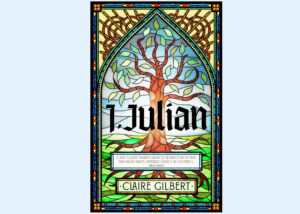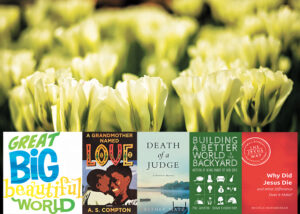Theology/Spirituality
Citizenship: Paul on Peace and Politics. Gordon Mark Zerbe. Canadian Mennonite University Press, 2012, 276 pages.
Gordon Zerbe, professor of New Testament at Canadian Mennonite University, takes a fresh look at Paul’s letters in the political and social context of his day. He believes that new understandings about the meaning of citizenship in the ancient Roman world give new insight into Paul’s writings.
For a Church to Come: Experiments in Postmodern Theory and Anabaptist Thought. Peter C. Blum. Herald Press, 2013, 178 pages.
In this collection of essays, Blum explores some philosophical ideas of postmodernism and compares them to the Anabaptist theology of John Howard Yoder.
Jesus on Justice: Living Lives of Compassion and Conviction. Don Posterski. World Vision Canada, 2013, 193 pages.
Using biblical stories, Posterski explores how Jesus serves as an advocate for justice for the oppressed, the outsider and those without power. Each of the 12 chapters includes current challenges and prayers of response, and each of the four sections includes suggestions for group discussion or self-reflection.
John. Willard M. Swartley. Herald Press, 2013, 593 pages.
In this recent Believers Church Bible Commentary, Swartley provides detailed information about the stories and themes of the fourth gospel. Like other commentaries in the series, each section of John also includes an analysis of the text in biblical context and in the life of the church.
Management and the Gospel: Luke’s Radical Message for the First and Twenty-First Centuries. Bruno Dyck. Palgrave Macmillan, 2013, 320 pages.
Bruno Dyck explores what the gospel of Luke has to say about wealth management. He explains the meaning of Jesus’ parables in the first century, when relationships were ultra-important, and how they should be understood in today’s individualized culture.
Radical Christian Discipleship. John Howard Yoder, edited by John C. Nugent, Andy Alexis-Baker and Branson Parler. Herald Press, 2012, 184 pages.
This book is a collection of previously unpublished lectures, articles and sermons by Mennonite theologian John Howard Yoder, primarily from the 1950s and ’60s. It is the first of a three-volume series of Yoder’s writings geared for non-academics.
Sacred Pauses: Spiritual Practices for Personal Renewal. April Yamasaki. Herald Press, 2013, 190 pages.
Using stories from everyday living, April Yamasaki reflects on what it means to make time and space in the midst of a hectic life to reflect and connect with God. She offers a variety of practical ways to find these sacred pauses. For those who enjoy journalling, she provides occasional journal prompts with suggestions of what to write.
Things Hold Together: John Howard Yoder’s Trinitarian Theology of Culture. Branson L. Parler. Herald Press, 2012, 264 pages.
John Howard Yoder has been criticized for having a problematic Christology that denies the Trinity, separates nature from grace, and rejects the goodness of creation. Parler, who works in the Reformed tradition, argues that those criticisms are unfair and explains how things hold together in Yoder’s theology.
History
The Constructed Mennonite: History, Memory and the Second World War. Hans Werner. University of Manitoba Press, 2013, 190 pages.
Hans Werner collected his father’s stories of growing up in a Mennonite community in Siberia and his many difficult experiences during the Second World War. Werner compared the stories to documented histories of the events and discovered that his father’s memories are profoundly shaped by self-perception and community context.
The Jesus Tribe: Grace Stories from Congo’s Mennonites, 1912-2012. Rod Hollinger-Janzen, Nancy J. Myers and Jim Bertsche, eds. Institute of Mennonite Studies, Elkhart, Ind., 2012, 273 pages.
To celebrate the centennial of Mennonite witness in the Democratic Republic of Congo, Africa Inter-Mennonite Mission compiled these 88 stories of Congolese Mennonite Christians. The short stories provide glimpses of how Mennonite churches took root there and flourished through the 20th century. Many stories have accompanying photos.
Jubilee: Lendrum Mennonite Brethren Church Celebrates 50 Years, 1962-2012. Lendrum Mennonite Church, Edmonton, 2012, 255 pages.
The various chapters of this large hardcover book examine many aspects of the past 50 years of the congregation with contributions from a wide variety of members. As well as descriptions of the programs and activities, there are reflections and sermon excerpts. The many colour photos enhance the story of this congregation.
Kroeger Clocks. Arthur Kroeger. Mennonite Heritage Village, Steinbach, Man., 2012, 175 pages.
Using his personal experience as part of the clock-making Kroeger family, Arthur Kroeger describes the history of these clocks and what they meant to the Mennonites who carefully transported them to South and North America. The glossy pages carry many large photos of various clocks that have survived.
Manufacturing Mennonites: Work and Religion in Post-War Manitoba. Janis Thiessen. University of Toronto Press, 2013, 249 pages.
Thiessen presents an in-depth analysis of the relationship between Mennonite labourers, their employers and their churches, especially those employed by Friesen Printers, Loewen Windows and Palliser Furniture. She conducted many personal interviews with workers and managers of the three firms.
A Mennonite Estate Family in Southern Ukraine (1904-1924). Nicholas J. Fehderau, translated by Margaret Harder and Elenore Fehderau Fast. Pandora Press, 2013, 340 pages.
Fehderau describes his early life in Ukraine before emigrating to Canada in 1924. This translated memoir, written in the German language many years ago, has been condensed and edited by Anne Konrad. It includes an introduction by John B. Toews.
Seeking Places of Peace—Global Mennonite History Series: North America. Royden Loewen and Steven M. Nolt. Good Books and Pandora Press, 2012, 400 pages.
This fifth and final book in the Global Mennonite History Series provides an overview of 300 years of Mennonite history in North America. Rather than looking at individual Mennonite groups, Loewen and Nolt give a composite picture, emphasizing broad themes and showing changing attitudes over time.
Other Books
Making Friends Among the Taliban: A Peacemaker’s Journey in Afghanistan. Jonathan P. Larson. Herald Press, 2012, 130 pages.
In 2010, a team of medical workers was ambushed and killed while travelling in Afghanistan. This book tells the story of Dan Terry, one of the team leaders, who had lived and worked in Afghanistan for many years. He was a humanitarian aid worker who devoted his life to making peace in this war-torn country.
Thrill of the Chaste: The Allure of Amish Romance Novels. Valerie Weaver-Zercher. Johns Hopkins University Press, 2013, 315 pages.
To understand why Amish romance novels have been selling so well in recent years, Valerie Weaver-Zercher researched the novels, the writers, the readers and the Amish themselves. While she herself is ambivalent about this genre, she recognizes that these chaste stories, set in an idyllic countryside, are attractive to many people.
Resources
Breathe It In: God Gives Life. MennoMedia, 2013, boxed set, five-day curriculum.
The 2013 Vacation Bible School material is based on Bible stories from both the Old and New Testaments relating to breath and wind. The curriculum is designed for children from early childhood to Grade 5, and includes worship, drama, singing and activities. The five daily themes can be adapted to 12 shorter sessions.
CDs/DVDs
Weaving Life: A Documentary on the Life and Death of Peacemaker Dan Terry. Eastern Mennonite University and MennoMedia, 2012, 58 minutes.
Dan Terry, a humanitarian aid worker in Afghanistan for many years, was killed there in 2010. Students from Eastern Mennonite University used interviews with family and friends, and some of Terry’s own photographs, to tell the story of his commitment to peacemaking in war-torn Afghanistan. A discussion guide is available at mennomedia.org.







Leave a Reply
You must be logged in to post a comment.